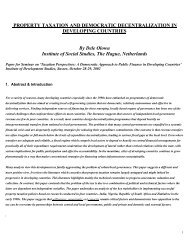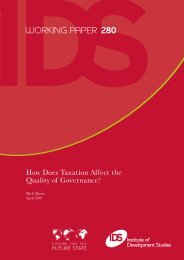View Article - Institute of Development Studies
View Article - Institute of Development Studies
View Article - Institute of Development Studies
You also want an ePaper? Increase the reach of your titles
YUMPU automatically turns print PDFs into web optimized ePapers that Google loves.
12uniform three-tier structure was not debated when the house adopted the amendment. Duringinterviews with senior bureaucrats who participated in the framing <strong>of</strong> the amendment itwas learned that the focus was on getting the amendment through even if it meant nothaving an ideal legislation. One result <strong>of</strong> this was that issues on which a consensus provedelusive were left to the discretion <strong>of</strong> the states.The principal features <strong>of</strong> the amendment, now part <strong>of</strong> the Constitution, are brieflysummarized below:• uniform three-tier system except for states with a population <strong>of</strong> less than 20 lakhs• direct election <strong>of</strong> members at all level• Reservation for Scheduled Castes, Scheduled Tribes in proportion to theirpopulation and 33% for women both for election as members and to posts <strong>of</strong>chairpersons except that in the latter case rotation <strong>of</strong> constituencies is mandatory.• Five year term for all Panchayats• Minimum age for membership reduced to 21• A state finance commission to be appointed every quinquennium.The Constitution also has certain enabling provisions. These are in respect <strong>of</strong>:• direct elections to the post <strong>of</strong> chairperson <strong>of</strong> the village panchayat• representation for members <strong>of</strong> Parliament and state legislatures in panchayats atthe intermediate and district levels• reservation in favour <strong>of</strong> backward classes in elections <strong>of</strong> members as alsochairpersons.• representation <strong>of</strong> chairpersons <strong>of</strong> one level at the next higher levelSubject to the mandatory articles <strong>of</strong> the Constitution “ the legislature <strong>of</strong> the statemay, by law, endow panchayats with such powers and authority as may be necessary toenable them to function as institutions <strong>of</strong> self-government and such law may containprovisions for the devolution <strong>of</strong> powers and responsibilities upon panchayats at theappropriate level, subject to such conditions as may be specified therein, with respect to:a) the preparation <strong>of</strong> plans for economic development and social justiceb) the implementation <strong>of</strong> schemes for economic development and social justice asmay be entrusted to them including those listed in the Eleventh Schedule” (<strong>Article</strong>243 G).





